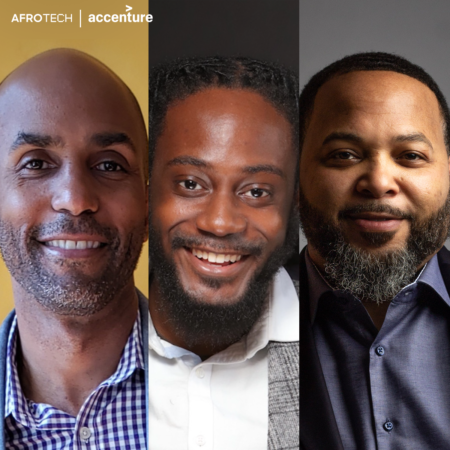The global professional services powerhouse Accenture is accelerating its efforts to tackle one of the most persistent challenges in the professional world: addressing inequality in the tech industry. Accenture is taking action to attract a deeper, more diverse pool of talent – pledging to increase the representation of Black employees and managing directors.
Whether Accenture is finding solutions for clients by bringing together industry experts, data scientists and business intelligence professionals or empowering its own professionals, the company has staked its reputation on creating strong leaders. That includes hiring rising Black tech professionals, several of whom recently spoke to AfroTech about their journey through the industry, the incredible work they are doing and how they’re paying it forward for those coming up behind them.
Black Talent Leading the Way at Accenture

Tony Olinger, Enterprise Salesforce Program Leader and Management Consultant
Already familiar with Accenture from prior experience as a client, Tony Olinger was recruited via LinkedIn a little less than two years ago. He focuses on Salesforce programs and implementations as a Technology Consulting Senior Manager. “When you hear about the Salesforce community, it seems big and vast, but actually the community is close knit, so having those relationships was a real advantage in my transition,” Olinger says.
Since joining Accenture, he cites these relationships as crucial in staying connected during a pandemic that has forced many to work remotely. “As I joined, I realized that a lot of internal capital you create is driven by the strength of your relationships, and that has been exacerbated even more. There’s a real need to be curious about the other people who work here, to seek them out and understand their experiences and learn from them,” Olinger says.

Michael Sloan, Security Consulting Senior Manager
Since joining Accenture in 2016, Michael Sloan has excelled in cyber defense and security analytics, focusing on improving client security operations capabilities to be more efficient and proactive. He currently serves as a Security Consulting Senior Manager.
“I joined Accenture after starting my career with one of the Big 4. My primary motivation for joining was based on a desire to develop a tangible technical skill set that would transcend any particular firm. In that aim, Accenture has exceeded my expectations. I’ve learned more than I expected, have been challenged in ways I never imagined, and have been afforded opportunities I thought would come much later in my career,” Sloan says.

Morgan Tucker, Managing Director Security Practice
A current Managing Director for Accenture’s North America Security practice, Morgan Tucker specializes in serving Accenture’s large chemicals, manufacturing and electric utilities customers. “Broadly speaking, my role is to be the cybersecurity quarterback for my accounts – bringing the best of Accenture Security to each of my clients. I was referred by a [Morehouse College] brother a little over a decade, and the years have flown by,” he says with a laugh.
Tucker cites diversity as something that’s evolved during his time at Accenture. “I came to Accenture in mid-2010. Our culture has definitely evolved since I first touched down here. Where I thought we had a good culture that said a lot of the right things with regard to inclusion, diversity and equity, we’ve since evolved into a place where I see my colleagues living I&D as a pillar of our culture.”

Patrick E. Polynice, Associate Director Cloud First Practice
Patrick E. Polynice understands the value of building and maintaining a professional brand within a large, complex organization. Since joining Accenture as an independent contractor in 2005, where he originally specialized in PeopleSoft implementations and upgrades, Polynice has risen through the ranks to become an Associate Director in the Cloud First Practice.
With a focus on Cloud implementations, Polynice says working in technology – and having access to mentors and sponsors who spotted his leadership potential – has opened doors for him. “I’ve been fortunate in being able to travel the world to deliver projects and sales proposals, and I’ve grown my career at Accenture from the hands-on tech guy to leading multiple work streams on complex global cloud transformation projects,” Polynice says. “I’ve been able to provide thought leadership and innovate through delivery by creating assets and challenging the norm.”
These skills have kept Polynice in demand as he continues to present at numerous technology conferences and internal events on behalf of Accenture. And he’s paying forward what he’s learned as a mentor through the company’s LEAP (Leading and Elevating Another Person) program. “Helping to elevate a colleague on their career path is a full-circle experience,” he says.

Patrick Saint-Tulias, Cloud Security
For first-generation college graduate Patrick Saint-Tulias, Accenture was a natural fit. In fact, the New York native believes he was meant for the organization.
“Accenture was my first choice when leaving college because there were managers from Accenture that would always come back to (Syracuse University) and provide mentorship to students,” Saint-Tulias says. “As fate would have it, one of the mentors (Rah Thomas) ended up being my first boss at Accenture.”
Saint-Tulias has successfully navigated five years at Accenture, where he currently specializes in Cloud Security. “I aid clients to understand the security implications of migrating to the cloud and help them architect solutions,” he says.
Since then, he’s built a solid career in technology, something he hopes can become a reality for more Black professionals interested in the field. “I’d like to see more representation of people of color in positions of influence that can steer the direction of the company to make lasting social impact and create social equity,” says Saint-Tulias.
Black in Tech: Overcoming Challenges and Hurdles
Michael Sloan: “The biggest challenge I think I’ve faced is imposter syndrome, the feeling of constantly needing to prove your worth or demonstrate that you’ve earned a seat at the table with each interaction. I don’t know that it’s a unique experience of Black professionals in tech, but nonetheless, it’s one that is acutely felt any time you don’t see yourself represented at large.”
Patrick Polynice: “I was the first in my family to pursue a career in technology. One of the biggest challenges I initially faced was finding my way around a large corporation. There were lots of unwritten rules. I soon learned the importance of building a meaningful network. I also learned the value of specializing in a specific area of technology in order to advance my career. That approach alone has paid off through a whole range of opportunities at Accenture.”
Patrick Saint-Tulias: “I think something many Black people hear is ‘Because you’re Black, you have to be 2 or 10 times better.’ I just felt like that was something that hindered me from being my full authentic self in the workplace, due to fears of making mistakes or not being good enough. I now remind myself I am great at what I do, and I’m excited to be great at what I don’t know I can do yet.”
Advice for Aspiring Black Tech Professionals
Tony Olinger: “As a Black professional in technology, you really have to advocate for yourself and prove that you are worthy of having that shot. I think the way you overcome that is subtle positive marketing of yourself. Share your accomplishments and aspirations so that others can match you with the right opportunity.”
Michael Sloan: “I think the notion of ‘finding your passion’ is slightly overblown. I would say, find something you can see yourself excelling in and believe will have staying power in the market. Technology moves quickly, but do your best to chart the evolution of whatever your area of focus may be. Once you’ve identified what that is, dive deep. Technology is a field that rewards those who specialize. Putting the hours in to become extremely proficient in a discipline will pay dividends.”
Morgan Tucker: “For those that I’ve seen push through challenges, it was often by deciding that ‘no’ was never going to be enough, remaining humble enough to truly assimilate feedback on areas of improvement and leveraging the power of their networks to help curate the support they needed to advance.”
Finding Success and Making Impact at Accenture
Michael Sloan: “During the first few months of the pandemic, I had an opportunity to be a part of an effort to secure a program that kept many small businesses afloat. While I was somewhat removed from the day-to-day aspect of the operation, I felt like we as Accenture, with the support of our partners, were doing our part to get through a very difficult time. As I look ahead, I’m encouraged by the stance our company has taken towards corporate citizenship and employee representation. As a global company, I like to see that we are increasingly trying to reflect the globe by being diverse and uniquely talented.”
Morgan Tucker: “I’m most proud of having helped — through coaching, mentorship, real talk and tough love — many of my peers and direct reports to achieve success in their own careers, whether through promotions, increased compensation or winning a dream role. Right now, I’m most psyched about the conversations I’m having with a number of Historically Black Colleges and Universities and Black Greek Letter Organizations about how Accenture Security might partner with them to seriously swell the pipeline of well-qualified and differentiated Black cybersecurity practitioners.”
Patrick Saint-Tulias: “My current project is with a client I previously worked with four years ago. They requested me to come back and work with them, and this time I was leading a team. It was the first time that my focus shifted from being project oriented to include people development. I enjoyed being able to manage personalities and skill sets, while also helping [my team] grow skills needed not just for this project, but for their long-term career goals. I’ve really received positive feedback from the client and the team. This year I’m excited to focus my attention on upskilling the people on my account through a learning series that I’m starting.”
—
As this group of Black professionals reflects on their careers at Accenture, they say support from colleagues and the availability of a wide range of opportunities have helped them soar. And it’s a journey they’re encouraging other Black professionals to embark on.
“Take on a mindset of continuous learning and never being satisfied with the skills or knowledge that you’ve amassed. Additionally, a key technology skill is storytelling. You need to be able to tell the story of your career and the story of your skills in a compelling way so that additional doors will open for you,” says Olinger.
At Accenture, Black professionals like these rising stars are definitely telling their own stories. Learn more about Accenture and career opportunities here.
This editorial is brought to you in partnership with Accenture.


